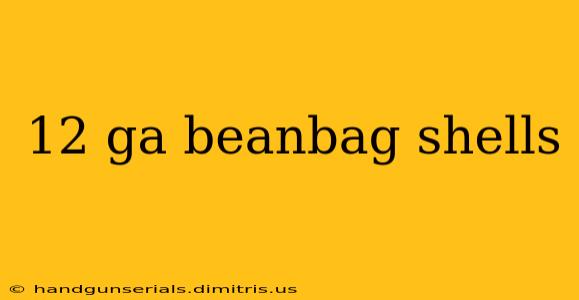Finding the perfect 12-gauge bean bag shell can be tricky. Whether you're a seasoned reloader or a curious newcomer, understanding the nuances of these specialized rounds is crucial. This guide dives deep into the world of 12-gauge bean bag shells, covering everything from their construction and uses to safety considerations and where to find them.
What are 12 Gauge Bean Bag Shells?
12-gauge bean bag shells are non-lethal ammunition designed for close-range incapacitation. Unlike traditional shotgun rounds filled with lead shot or slugs, these shells contain numerous small, typically fabric-covered pellets, often made from materials like plastic or resin. The pellets are designed to deliver a blunt impact, causing pain and disorientation without the serious wounding potential of traditional projectiles.
Uses for 12 Gauge Bean Bag Shells
These specialized rounds have several applications, primarily in law enforcement and self-defense scenarios. However, it's crucial to understand the limitations and legal implications before using them.
Law Enforcement Applications:
- Crowd Control: Bean bag rounds are often employed to subdue unruly individuals or disperse crowds without causing severe injuries.
- Less-Lethal Option: They offer a less-lethal alternative to firearms in situations where deadly force isn't justified but immediate incapacitation is necessary.
- High-Risk Situations: Bean bag rounds can be used in hostage situations or during arrests where minimal injury is paramount.
Self-Defense Considerations:
While some may consider them for home defense, the legal ramifications and potential for unintended consequences need careful consideration. The effectiveness of bean bag rounds can vary depending on factors like distance, target clothing, and the type of filler material. Local laws regarding less-lethal self-defense options should be thoroughly investigated before considering bean bag shells.
Other Uses:
Beyond law enforcement and self-defense, some individuals utilize bean bag shells for training purposes or specialized hunting situations (though these are less common).
Components of a 12 Gauge Bean Bag Shell:
A typical 12-gauge bean bag shell consists of:
- Shell Casing: A standard 12-gauge shotgun shell casing.
- Wadding: Material separating the powder charge from the bean bag payload.
- Powder Charge: The propellant that drives the shell from the firearm.
- Bean Bag Payload: A fabric pouch containing numerous small pellets.
Safety Precautions:
Crucially, using 12-gauge bean bag shells requires a responsible and informed approach. Always adhere to these safety guidelines:
- Proper Training: Seek professional instruction on the safe handling and use of shotguns and less-lethal ammunition.
- Appropriate Firearm: Ensure your shotgun is compatible with bean bag rounds. Some shotguns may not function reliably with these specialized shells.
- Target Selection: Never use bean bag shells against hard surfaces or at ranges beyond their effective distance, as this can increase the risk of ricochet and injury.
- Legal Considerations: Be fully aware of and compliant with all local, state, and federal laws regarding less-lethal ammunition and self-defense.
Finding 12 Gauge Bean Bag Shells:
While commonly available to law enforcement agencies, purchasing 12-gauge bean bag shells for civilian use can be more challenging. Regulations vary widely by region, and some areas may restrict or prohibit their sale. It is vital to check your local regulations and only purchase from reputable and licensed vendors. Remember that responsible ownership and use are paramount.
Conclusion:
12-gauge bean bag shells represent a specialized type of ammunition with specific uses and limitations. Understanding their construction, applications, and safety protocols is paramount. Always prioritize responsible ownership, legal compliance, and safe handling practices when dealing with less-lethal options like these. This information is for educational purposes only and does not constitute legal or professional advice. Always consult relevant authorities and experts before making any decisions regarding the purchase or use of bean bag shells.

